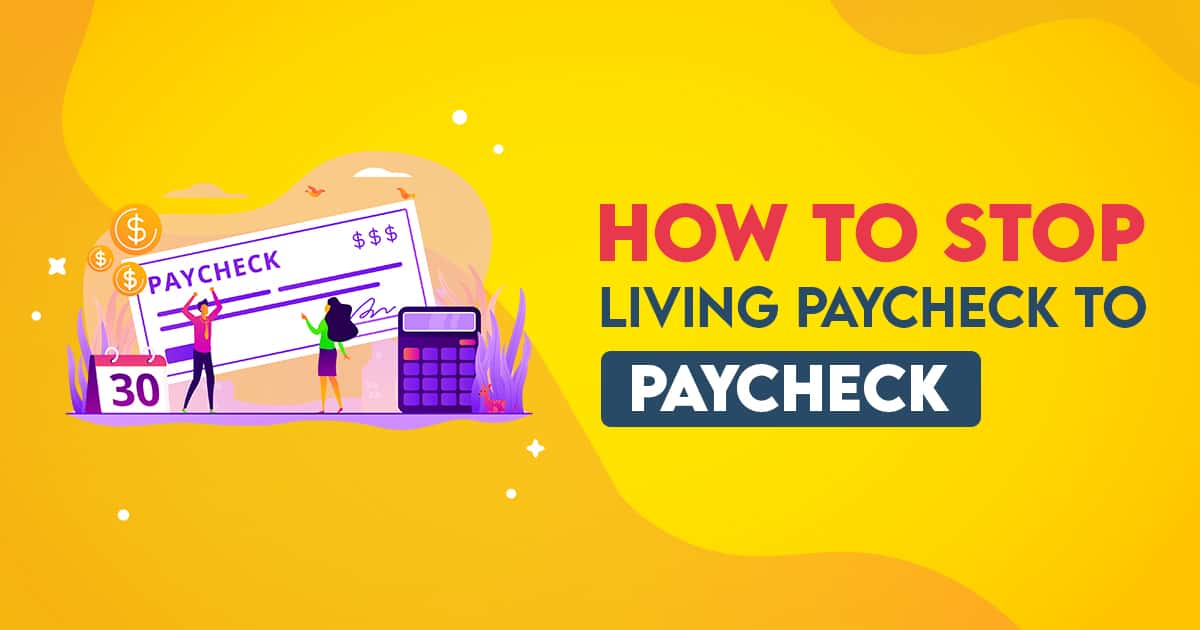Do you wish you could stretch your paycheck to last longer? Perhaps your account balance gets dangerously low as you impatiently wait for your next check to come through.
If you can relate, you are likely living paycheck to paycheck as most Americans are. According to a CareerBuilder survey, 78% of U.S. workers are living paycheck to paycheck and 1 in 4 workers don’t set any savings aside.
Before we dive into some key ways to break the paycheck to paycheck cycle, let’s first clarify what it is and why it can be so damaging to your financial health.
What Does Living Paycheck to Paycheck Mean?
Have you ever told yourself or your family not to spend any more money until you get paid on Friday? If so, you’re likely earning just enough to cover your expenses for the month.
The money that comes in has to almost immediately go toward bills, needs and other wants. This often leaves very little leftover and can create financial tension as you wait for the next paycheck or ‘financial fill-up’ to fund your lifestyle. Then, you repeat the cycle of draining your checking account to cover expenses all over again.
It’s a tough place to be because if you suddenly lost your income or had work reduced hours, you may not be able to meet your basic needs. Not to mention, there is hardly ever enough cash flow to save or get ahead on debt payments when you live this way. Getting stuck in the paycheck to paycheck cycle can occur even if you earn a higher income.
In fact, 1 in 10 workers making $100,000+ per year live paycheck to paycheck according to Career Builder’s survey. Even though it’s unfortunately common, you don’t have to live this way for the rest of your life.
These 4 key steps will show you how to stop living paycheck to paycheck.
Step 1: Take 100% Responsibility For Your Financial Situation
This can be tough to do sometimes, but acknowledging the situation and taking responsibility for the role you play is an important first step to fixing any issue in your life.
When it comes to living paycheck to paycheck, there are probably outside factors that play a role whether you live in a high cost of living area or your employer doesn’t provide overtime hours. It’s important to focus on what you can control on your end.
Your financial choices have a direct effect on your situation. A great analogy is when you think about dieting or getting healthy. Perhaps there are genetic factors (outside of your control) that can contribute to your overall health. At the same time, you have full control over what you choose to eat and how often you make healthy decisions.
Understand that if you want to stop living paycheck to paycheck, you have the power to change your situation and make better financial decisions. Knowing this can help motivate you to stay focused on your goal and avoid making excuses or letting outside factors deter you.
Step 2: Start Planning and Get on a Budget
Having a budget is going to be your best tool to combat the paycheck to paycheck cycle. A budget is basically a spending plan that tells you how much money is coming in and how much is going out each month.
A Gallup poll found that only 32% of Americans use a household budget. Setting up a budget is easy and more people should do it. All you need to do is list out all your expenses for the month and all your sources of income.
However, the key is to make sure you’re budgeting correctly during the month. Start by tracking your spending using a free program like Mint. See where your money is going and if it’s matching up with the budget categories you laid out.
If you’re spending more than you expected in an area, focus on reducing your expenses to match the budget you laid out.
Some Common Ways to Cut Expenses:
Trade in your cable TV plan for streaming services like Netflix or Hulu
Drive an older (used) vehicle that is cheaper to fuel up and maintain
Limit dining out and cook more meals at home (maybe commit to dining out or doing happy hours with friends once per week)
Use Groupons to save money on restaurant meals as well
Make your own coffee at home 90% of the time or get coffee for free at work
Shop around for cheaper car insurance rates
Use rebate services like Ibotta and Fetch Rewards to get cash back on your groceries
Lower your cell phone bill by switching to a prepaid service
Consider a bundle family plan if your kids and spouse have a cell phone too
The goal is to make sure your expenses do not exceed income. When this happens, you’ll have money leftover after your bills are paid.
You can use this extra cashflow to get ahead by paying off some of your debt. A lot of people who are living paycheck to paycheck have ongoing debts that are eating away at their disposable income.
In fact, the average American household is carrying $5,700 in credit card debt and around $90,000 of personal debt overall. If you can stick to a spending plan and free up some money in your budget to put extra toward that debt, you can pat it off faster and free up more income.
Step 3: Avoid Lifestyle Inflation
Lifestyle inflation is one of the biggest killers of wealth. It occurs when you spend more money or ‘inflate’ your lifestyle with unnecessary luxuries.
It’s the reason why the saying ‘more money more problems’ still holds true today. If you get a raise at work or come into some extra money and start spending more as a result, this can keep you stuck in the paycheck to paycheck cycle.
It’s not uncommon for people earning higher salaries like $500,000 per year to easily fall into lifestyle inflation. On a deeper level, this is often caused by society pressures to keep up with friends and colleagues as well as the inner desire to keep obtaining more items in the hopes of becoming happier overall.
However, research shows that new and diverse experiences are linked to increase happiness and this has nothing to do with buying an expensive car or the largest flat screen T.V. you can find.
Step 4: Increase Your Income
Are you truly tired of living paycheck to paycheck? It’s likely time to increase your income. Earning more can help you create an even bigger gap between income and expenses.
It’s important to focus on the other steps first before you try to earn more because you have to build a solid foundation first. There are plenty of people who earn a lot of money and still live paycheck to paycheck because they don’t know how to manage it.
This is why many lottery winners and quite a few celebrities and professional athletes go broke even after having a ton of money. Making more money can and should be a good thing so long as you know how to manage it well.
See if you can get a raise or promotion at your job or consider getting a side hustle. You may even want to consider advancing your career with more education and certifications. If you have to spend some time upgrading your education or getting a certification that can make you more marketable for higher paying work, it will definitely be worth it in the end.






